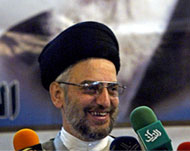Iraq elections: Key players
Iraqis will choose from among 231 political parties, coalitions and individual candidates in parliamentary elections on 15 December.

While a vast and potentially confusing number, only a handful of the lists are expected to be strong contenders.
The following is a rundown of some of the key personalities who hold sway in the elections:
Grand Ayatollah Ali al-Sistani
Al-Sistani is considered the most powerful man in Iraq. The 74-year-old is the highest religious leader among Iraq’s Shia.
His style is to stay out of the day-to-day politics of Iraq but he has occasionally flexed his muscles, with the ability to bring hundreds of thousands of Shia onto the streets and quickly. The leading United Iraqi Alliance is considered al-Sistani’s party of choice, made up of primarily 18 conservative Shia Islamist groups.
Prime Minister Ibrahim al-Jaafari
 |
|
Al-Jaafari is known as a |
Al-Jaafari is the second post-war Iraqi prime minister. The 58-year-old former GP leads the Islamic Dawa party, which is a major player in the dominant United Iraqi Alliance and which presently holds about half of the existing assembly’s 275 seats.
Since becoming prime minister, critics complain that he has not used his status effectively.
President Jalal Talabani
 |
|
Jalal Talabani is the first Kurd to |
A leader of Iraq’s minority Kurds, he was elected Iraq’s new president in April 2005 and is the first Kurd ever to hold the job.
His Patriotic Union of Kurdistan (PUK) party, along with the Kurdistan Democratic Party (KDP) of Masoud Barzani represent Kurdish interests in the north of the country. This area has been largely autonomous since 1991, and Talabani’s coalition is pushing to preserve a federal structure in Iraq which will allow the Kurds to maintain control of their territory and resources.
Abdul-Aziz al-Hakim
 |
|
Al-Hakim’s SCIRI party has wide |
Al-Hakim leads the powerful Shia party the Supreme Council for Islamic Revolution in Iraq (SCIRI), which is considered pro-Iranian. SCIRI has a wide support base in Iraq and Hakim is seen as an effective power broker.
His party is expected to consolidate much of its parliamentary power in the elections.
Iyad Allawi
 |
|
The former Iraqi prime minister |
The first prime minister since the fall of Saddam, Allawi became Iraq’s interim prime minister in June 2004 and held the job until January 2005. Allawi leads the Iraqi List alliance, a secular party which presently holds 40 seats.
He is hoping to significantly increase this number and to even contend for the top job again. Allawi is considered America’s top choice for prime minister in the coming elections.
Deputy Prime Minister Ahmad Chalabi
 |
|
Chalabi’s political skills are |
Once Washington’s favoured man and a prime architect behind the Iraq war, Chalabi has had a rollercoaster political career in just the past three years.
His Iraqi National Congress party is an important player in the United Iraqi Alliance and Chalabi remains an ever wily political operator.
His ability to manoeuvre among the secular and religious, and win favour from both American and Iranian officials, has landed him the role of deputy prime minister.